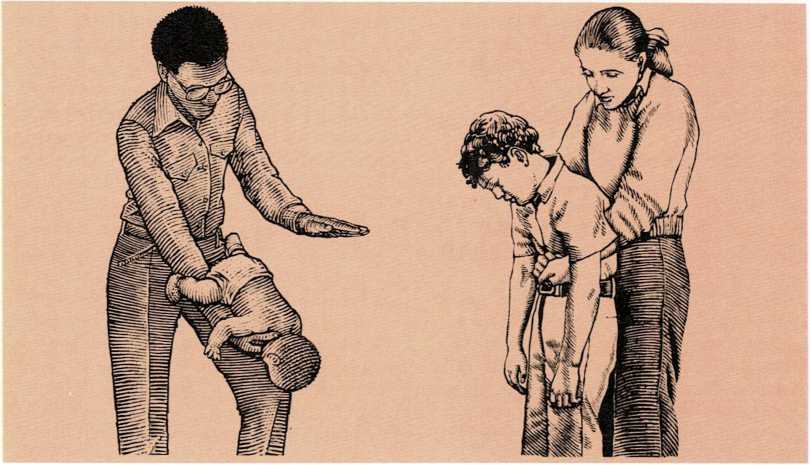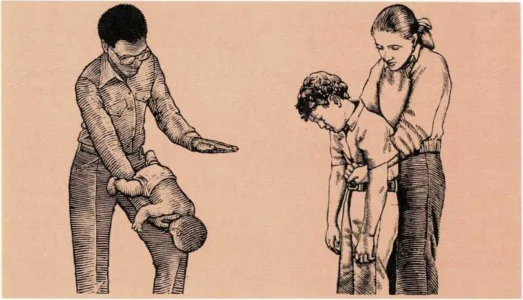Choking – Chorea
Choking. A child may choke from accidentally breathing food or other
objects into the windpipe. If the child is coughing violently but can
still breathe, go to the nearest hospital immediately. If possible, have
someone telephone your doctor to meet you there. If the child is choking
and cannot breathe, waste no time. Use one of the following
procedures, depending upon the age of the child and the situation:
Baby less than 1 year old
Hold the baby on your forearm, head down, at a 60-degree angle.
With the heel of your hand, slap the baby’s back, high between the
shoulder blades, four times to force the object out of the
windpipe.If the airway is still obstructed, place the baby faceup on a firm
surface.Using two fingers, give /b?w rapid thrusts over the breastbone.
If the baby still does not breathe, open the baby’s mouth and move
the jaw forward. This will lift the tongue.Look in the baby’s mouth for a foreign body. If you find one, remove
it. (Do not, however, blindly sweep the mouth and throat with your
fingers.)If you find no obstruction, apply CPR (see CPR for detailed
instructions).Continue CPR until the baby starts to breathe or until emergency
medical care arrives.
Child more than 1 year old
Lay the child faceup on a firm surface. Face the child and kneel,
straddling the child’s hips.Place one of your hands over the other, with the heel of the bottom
hand on the child’s abdomen (slightly above the navel and below the
ribcage).Press your hands into the child’s abdomen with a quick upward
thrust. Repeat this action four times. (This action—the Heimlich
maneuver—forces air out of the child’s lungs and blows the object
from the windpipe. If the child is older and is standing, this same
maneuver can be performed as shown in the illustration.)If the obstruction remains, open the child’s mouth and move the jaw
forward. This will lift the tongue.Look in the child’s mouth for a foreign
First aid for choking

If a baby or very young child is choking (left), hold on your
forearm, as shown, and slap the back repeatedly. If an older child is
choking (right), wrap your arms about the waist, lock your hands
together, and thrust upward.
body. If you find one, remove it. (Do not, however, blindly sweep the
mouth and throat with your fingers.)
If you find no obstruction, apply CPR (see CPR for detailed
instructions).Continue CPR until the child starts to breathe or until emergency
medical care arrives.
Babies and toddlers can choke on small objects they place in their
mouths. Encourage your child to give you any such objects found, then
thank the child and substitute a safer object. Make sure that stuffed
toys and dolls do not have eyes made of buttons, beads, or glass.
Children can also choke on food particles. Train your child to chew food
thoroughly and not to talk while eating. Do not give a child under 4
years of age small, hard foods, such as peanuts, hard candy, popcorn,
raisins, coin-sliced carrots, or carrot sticks. Grapes and hot dogs with
smooth skins may also cause choking, [m g.]
See also Accidents; CPR; Coughing; Gagging; Swallowed objects
Chorea (formerly called St. Vitus’s dance), is a disease of the
nervous system which causes uncontrollable twitching of muscles in the
face, arms, legs, or of the entire body. An attack of chorea usually
lasts about six weeks, and it gradually subsides without damaging the
child’s nervous system. The disease most commonly affects children from
7 to about 15 years of age. Doctors do not know what causes chorea.
The twitching may be mild and infrequent, or it may be severe and almost
continual. Children with chorea may have difficulty in writing or in
feeding themselves. They may walk awkwardly and be clumsy when carrying
things. In severe cases, the muscular jerking may cause children to fall
out of bed. Children with chorea may become nervous, irritable, and
emotionally upset.
Call your doctor if you suspect your child has chorea. The doctor may
prescribe sedatives and bed rest, [a.g.s.]
See also Ataxia; Rheumatic fever; Tic
Chromosomes. See Heredity

